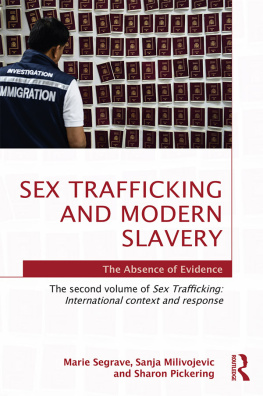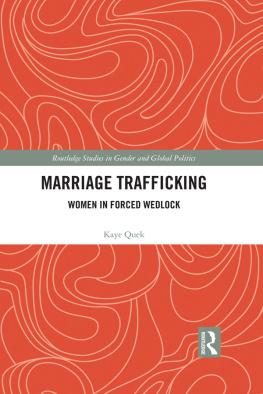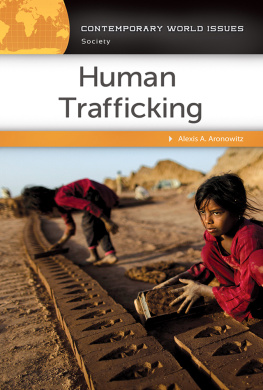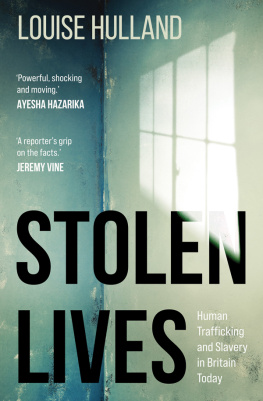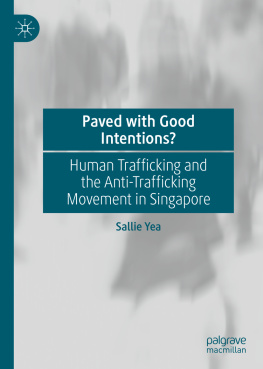Sex Trafficking and Modern Slavery
Human trafficking and modern slavery have captured the imagination and attention of the international community. This book builds on the authors first volume, Sex Trafficking: International context and response. Much has changed since the first volume was published, not least the shift away from sex trafficking to modern slavery as the dominant focus in policy and advocacy. Yet, as the authors argue, little has changed with regards to how nations respond. This volume re-examines the international counter-trafficking scholarship and policy response, to offer an analysis based on original and new data. This book lays the ground for specific forms of research and inquiry that are necessary to better understand and respond to the range of exploitative practices and conditions that give rise to human trafficking.
This book offers a detailed analysis of the dominant response to human trafficking, which is framed by the criminal justice process. Examining the identification of victims, the investigation of cases, victim support, prosecutorial decisions and repatriation practices, the authors draw upon original research from Australia, Serbia and Thailand: three diverse nations that, like nations across the globe, have invested heavily in criminalisation as the dominant response to counter trafficking. They argue that exploitation sits at the nexus of global migration patterns and emphasise the importance of speaking to those directly affected by counter-trafficking policies and those directly involved in their implementation in order to produce empirical data to inform how we make sense of the numbers that are produced, the outcome of the policies and how we ought to determine success in this context.
An empirical, criminologically informed opportunity to reconsider the dominant ways of understanding and strategies of responding to human trafficking, this multi-disciplinary book will be of interest to those engaged in criminology, sociology, law, political science, public policy and gender studies.
Marie Segrave is an Associate Professor in Criminology at Monash University and leads the Trafficking and Labour Exploitation research agenda of the Border Crossing Observatory. She is also an ARC DECRA Fellow researching unlawful migrant labour, exploitation and regulation (20142018).
Sanja Milivojevic is Senior Lecturer in Criminology at La Trobe University. Her primary research interest is migration and borders. Sanjas latest book Sexting and Young People is published by Palgrave (with Crofts, Lee and McGovern).
Sharon Pickering is Professor of Criminology and Dean of Arts at Monash University. She is co-director of the Border Crossing Observatory and author of 14 books.
In sharp contrast to the myths and sensationalism that permeate anti-sex trafficking initiatives, this impressive book draws on original empirical research in three nations to expose the complex, but all-too-ordinary, dynamics that are at the foundation of trafficking and exploitation, including barriers to citizenship, border fortification, and economic and political marginalization. The authors poignantly reveal the collateral damage caused by contemporary law and order approaches to trafficking and persuasively argue that to significantly reduce exploitation a framework of response is needed where migration and mobility are at the forefront. This book is absolutely essential reading for anyone willing to honestly examine the sources of human trafficking so that we might end it.
Nancy A. Wonders, Professor of Criminology and Criminal Justice, Northern Arizona University, USA
Drawing on original and recent empirical research across such diverse settings as Australia, Thailand and Europe, Sex Trafficking and Modern Slavery offers an insightful analysis of contemporary counter-trafficking strategies and the collateral damage that they produce. The book does a wonderful job at systematically debunking the persistent myths and assumptions about trafficking and makes for fascinating reading. It will be of wide interest not only to critical feminist criminologists but to academics from a range of disciplines, as well as practitioners, activists and policy-makers.
Katja Franko, Professor in the Department of Criminology and Sociology of Law, University of Oslo, Norway
Sex Trafficking and Modern Slavery
The Absence of Evidence
The second volume of Sex Trafficking: International context and response
Marie Segrave, Sanja Milivojevic and Sharon Pickering

Second edition published 2018
by Routledge
2 Park Square, Milton Park, Abingdon, Oxon, OX14 4RN
and by Routledge
711 Third Avenue, New York, NY 10017
Routledge is an imprint of the Taylor & Francis Group, an informa business
2018 Marie Segrave, Sanja Milivojevic and Sharon Pickering
The right of Marie Segrave, Sanja Milivojevic and Sharon Pickering to be identified as authors of this work has been asserted by them in accordance with sections 77 and 78 of the Copyright, Designs and Patents Act 1988.
All rights reserved. No part of this book may be reprinted or reproduced or utilised in any form or by any electronic, mechanical, or other means, now known or hereafter invented, including photocopying and recording, or in any information storage or retrieval system, without permission in writing from the publishers.
Trademark notice: Product or corporate names may be trademarks or registered trademarks, and are used only for identification and explanation without intent to infringe.
[First edition published by Willan 2009]
British Library Cataloguing-in-Publication Data
A catalogue record for this book is available from the British Library
Library of Congress Cataloging-in-Publication Data
Names: Segrave, Marie, 1979 author. | Milivojevic, Sanja, 1972
author. | Pickering, Sharon, 1972 author.
Title: Sex trafficking and modern slavery : the absence of evidence /
Marie Segrave, Sanja Milivojevic and Sharon Pickering.
Description: Abingdon, Oxon ; New York, NY : Routledge, 2018. |
The second volume of Sex Trafficking: International context and
response. | Includes bibliographical references and index.
Identifiers: LCCN 2017015124 | ISBN 9781138686762 (hardback) |
ISBN 9781315542560 (ebook)
Subjects: LCSH: Human trafficking. | Human trafficking
Government policy. | Slavery. | SlaveryGovernment policy.
Classification: LCC HQ281 .S449 2018 | DDC 306.3/62dc23
LC record available at https://lccn.loc.gov/2017015124
ISBN: 978-1-138-68676-2 (hbk)
ISBN: 978-1-315-54256-0 (ebk)
Typeset in Goudy
by Apex CoVantage, LLC
To our families.
Contents
The title of this book is a provocation. To suggest that there is an absence of evidence on sex trafficking, human trafficking and modern slavery is not entirely true. There is evidence that these exploitative practices occur. We do not seek to deny that these practices occur. However, the evidence is fraught: accurate measures of prevalence are complicated to achieve. And while efforts to chase the best evidence base of accurate measures of the size or frequency of exploitation continue apace, we are concerned with the international response, and the absence of evidence regarding the impact or effectiveness of counter-trafficking practices. In the absence of evidence, many practices can continue unchallenged. We believe the bar must be set higher, and that it must begin with a commitment to interrogating the current response and being open to the possibility that to end exploitation a different approach may be necessary. This book offers evidence to suggest that some efforts are, at best, misplaced, and at worst are counterproductive.

